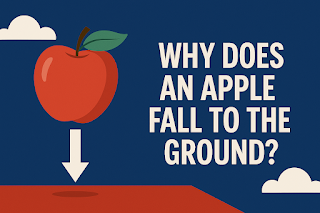Why Does an Apple Fall to the Ground?
Understanding Gravity in Simple Terms
Have you ever wondered why an apple, when it falls from a tree, always
drops straight down to the ground and never floats up into the sky?
It’s a simple everyday event, but it holds the key to one of the
greatest scientific discoveries in history — gravity. Let's break it
down and explore why apples fall and what it teaches us about how the
universe works.
The Story Behind the Falling Apple
The story goes that over 300 years ago, a young man named Isaac
Newton was sitting under an apple tree when he saw an apple fall to the
ground. That simple moment sparked a question in his mind:
“Why did the apple fall down instead of going sideways or up?”
This curiosity led him to discover the law of gravity, a force
that affects every object in the universe.
What Is Gravity?
Gravity is a natural force that pulls things toward each other.
On Earth, it pulls objects toward the center of the planet — that’s why
things fall down, not up.
Every object with mass has gravity. The more mass it has, the stronger
its gravity.
- Earth has
a lot of mass, so its gravity is strong.
- You also
have gravity, but it’s so tiny that it only affects small things nearby —
and is too weak to notice.
So when an apple falls, Earth’s gravity pulls it downward.
Newton’s Law of Universal Gravitation
Isaac Newton explained gravity with a simple but powerful formula:
Every object in the universe attracts every other object with a force.
This force depends on two things:
1.
Mass of the objects
2.
Distance between them
This means the apple and the Earth are both pulling on each other — but
Earth is so much bigger that the apple moves, not the Earth!
Real-Life Example: Jumping on Earth vs. the Moon
Have you seen astronauts bouncing on the Moon?
That’s because the Moon’s gravity is weaker than Earth’s. So when
you jump, you can go higher and stay in the air longer on the Moon than you can
on Earth.
The apple would also fall slower on the Moon than it does on
Earth.
Why Does the Apple Fall Straight Down?
The apple falls straight down because gravity pulls objects toward
the center of the Earth. It doesn’t matter if the apple is big or small,
ripe or unripe — gravity acts on all of them equally in the same location.
This is also why rain falls down, and why you stay grounded when you
walk or run. Gravity keeps everything on Earth attached to it — even the oceans
and the air!
Common Misunderstandings
1. Is the apple “trying” to fall?
No. Gravity is not about the apple’s will — it’s about forces.
The apple is being acted upon by Earth's gravitational pull.
2. Is there no gravity in space?
There is gravity in space. In fact, gravity is what keeps the planets
in orbit, holds galaxies together, and gives stars their shape. Astronauts
float not because there’s no gravity, but because they are in free fall,
falling around Earth as the spacecraft orbits.
How Do We Experience Gravity Daily?
- Walking: Gravity
keeps your feet on the ground.
- Water
Flowing Downhill: Water flows downward due to
gravity.
- Ball
Falling: Throw a ball up — it slows down, stops, then comes back down.
- Using a
Slide: You go down a slide because gravity pulls you downward.
Gravity is Everywhere
Gravity doesn't just work on Earth. It's a universal force.
- It keeps
the Moon orbiting Earth.
- It keeps Earth
orbiting the Sun.
- It holds
together entire galaxies.
- It even
bends light when it's strong enough — as seen around black holes.
Summary
So, why does an apple fall to the ground?
Because of gravity — a force that pulls the apple toward the center of
the Earth. This invisible force is always acting on us, holding us, the air,
and everything else to the planet. Thanks to Isaac Newton’s curiosity, we now
understand not just apples falling, but the entire structure of the universe.













0 Comments
What do you think about this post ? Share below